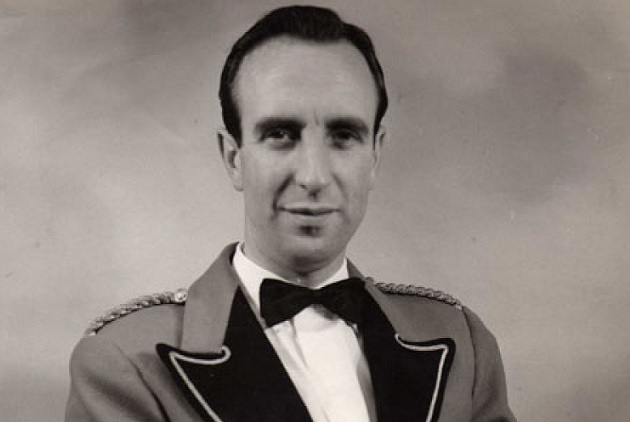
18: Teddy Gray (1927 – 2009)
In many ways Edward ‘Teddy’ Gray was something of an anachronism as a principal cornet player of one the leading bands in the UK for over 20 years.
Although assured and confident in his abilities he never sought the spotlight of acclaim.
Without knowing him it could have been mistaken for a lack of ambition – yet nothing was further from the truth: Teddy just wasn’t the type of man who felt the need to display his talents for mere self-aggrandisement. He enjoyed the communal nature of banding, far, far more.
Destiny
Born in Aspull near Wigan, Teddy and his elder brother Harry were taught by their father, Edward Gray, also a cornet player. He realised the potential shown by his lads at an early age and being an accomplished cornetist himself their musical destiny was set.
In 1934, aged just seven, Ted and his brother played the cornet duet ‘Ida & Dot’ on BBC radio’s ‘Children’s Hour’. Listened to by hundreds of thousands of people it was a glimpse of things to come.
Teddy just wasn’t the type of man who felt the need to display his talents for mere self-aggrandisement. He enjoyed the communal nature of banding, far, far more.
His father soon sent him to Hindley Band where he stayed for four years before they joined a fine Wingates Temperance Band. Aged just 12, their names appear in the contest programme that marked the 1939 September Belle Vue ‘Open’ victory on John Ireland’s ‘A Downland Suite’.
That eye for an opportunity (and potential job security) saw them join the emerging Bickershaw Colliery Band in August 1939. A year later they also won the Open on ‘Clive of India’.
His talent was being nurtured and the next few years were spent learning his craft.
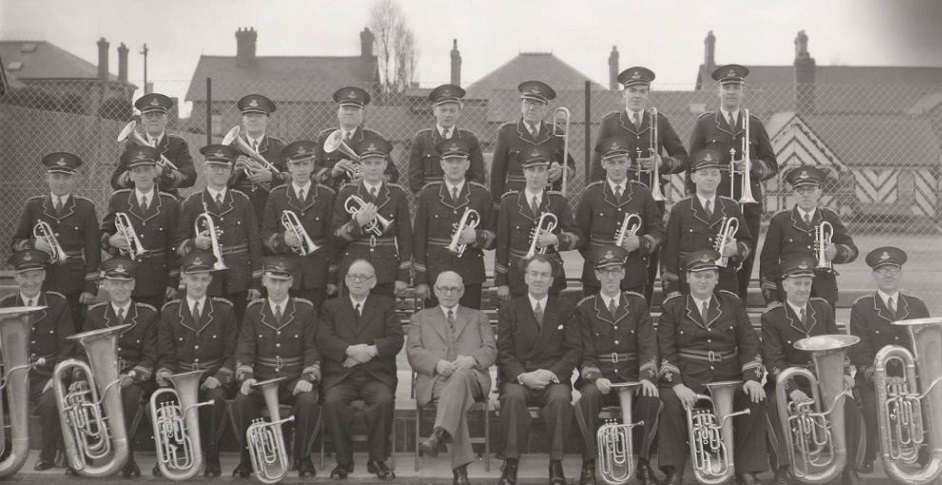
Early days at Foden's under Fred Mortimer
Potential tapped
In a letter dated April 1941 sent by the ambitious pit owner Major Ernest Hart to conductor William Haydock, he noted that; “The boy Gray was at the Colliery yesterday and I gather they fixed him up with some work in the office.
In the meantime it would be advisable as you suggest to let him come to you for tuition in the afternoon and I will arrange for him to leave the Colliery at any time to suit your convenience.”
His obvious potential tapped, he was an integral part of the band that claimed the 1943 ‘Open’ with what Henry Geehl called ‘a masterly performance’ of Beethoven’s ‘Fifth Symphony’.
War service
However, as an office worker in the colliery Teddy Gray was not in a ‘protected’ occupation, and in 1944 he was called up to serve with the Lancashire Fusiliers followed by the Royal Army Service Corps.
He was not to return to civilian banding for four years.
His talent had not been forgotten though and in 1948 Harry Mortimer recommended him to his father at Foden’s where he accepted a seat on the solo cornet bench.
His talent had not been forgotten though and in 1948 Harry Mortimer recommended him to his father at Foden’s where he accepted a seat on the solo cornet bench.
When Bram Gay left to do his National Service, Teddy was promoted to the principal cornet seat. He held it for the next 23 years.
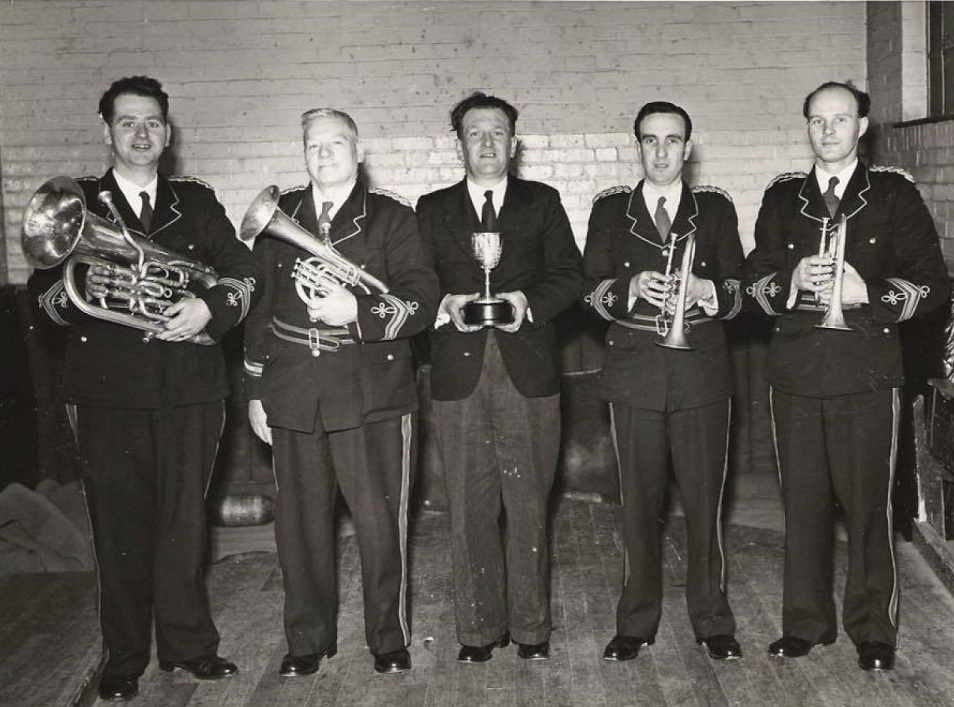
Learning his craft with the prize-winning Foden's Quartet
Foden’s were no longer the pre-eminent band of the age, but still a very good one. With him as Harry’s trusted ‘right hand man’, he was part of the band that claimed the National title in 1950, and then again in 1953 and 1958 (under Rex Mortimer).
He also added a fourth British Open to his CV in 1964 as well as North West Area titles in 1949, 1950, 1953 and 1956 and the prestigious Festival of Britain Championship in 1951.
Peak years
Now, heading towards the peak years of his playing, he nonetheless still sought communal rather than individual acclaim.
He repeatedly declined the opportunity to try and win the solo championship of Great Britain title and instead led the Foden (A) quartet to become National Quartet Champions in 1950, 1951 and 1956.
This then was a man blessed with all the virtues of greatness as a brass band cornet player - a sound as clear as a perfectly forged bell, security of range and technique, stamina and above all else, musicality.
However, when Foden’s won the National title in 1950 they did so on ‘Pageantry', a work whose third movement ‘Jousts’ is heralded by a brilliant call to arms by the principal cornet.
With the spotlight of the banding world bearing down on him on the Albert Hall stage, he produced what one adjudicator called an “absolutely perfect” fanfare.
Virtues of greatness
This then was a man blessed with all the virtues of greatness as a brass band cornet player - a sound as clear as a perfectly forged bell, security of range and technique, stamina and above all else, musicality.
Yet he never flaunted it, instead relying on a subtle appreciation of line and phrase, craftsmanship and skill.
Yet he never flaunted it, instead relying on a subtle appreciation of line and phrase, craftsmanship and skill.
Like the great Norman Ashcroft at Fairey, rather than the more flamboyant Derek Garside at CWS (Manchester), he was content to let his playing stand comparison in an ensemble rather than solo setting.
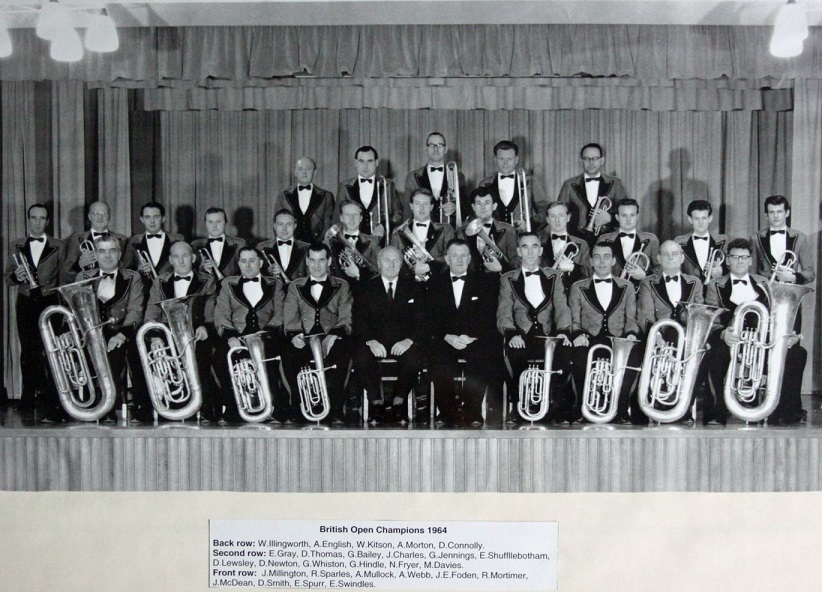
The last Open victory in 1964
Musical personality
Two stories about him illustrate the twin aspects of his musical personality.
As the principal cornet of Harry Mortimer’s Men O’ Brass and All-Star Band, he led them on a celebrated recording with Sir Malcolm Sargent in 1965. It featured some of Sargent's arrangements for brass band, one of which was a Chopin prelude for piano, known as 'Raindrop'.
So beautifully did he play with stylish understanding the great conductor turned to him and said, "You would have made a wonderful pianist".
It was some endorsement.
So beautifully did he play with stylish understanding the great conductor turned to him and said, "You would have made a wonderful pianist".
Own limitations
However, on another occasion he ventured to suggest to Fred Mortimer, that it might be appropriate for him to make a cut in a solo to help him out. A rather curt reply from the old man put him firmly in his place.
"If you can find a good place to make a cut between the Introduction and the Coda, then we'll make it". Teddy played the solo in full.
That perhaps explains why, despite the Foden’s legendary player Ted Swindells saying that throughout his tenure as top-man, he “...never ever heard Teddy make a serious mistake, whether in rehearsal, concert or contest", he was a player who knew his own limitations – especially as a soloist.
Once, in a massed band concert under guest conductor, Walter Hargreaves, the ‘Wee Professor’, enquired to why Teddy was not sat in the principal cornet seat and was instead to be found quietly settled in the fifth solo cornet chair. He rather reluctantly returned.
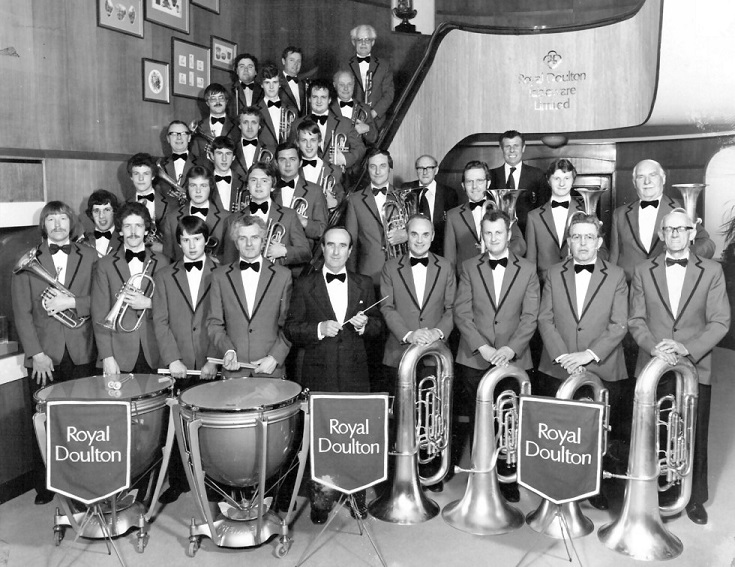
The conductor moulding a new band
In 1971 he took the decision to leave Foden’s and concentrate on conducting (he had become Bandmaster at Foden's) and local authority peripatetic teaching.
Conductor
Aged 44, he perhaps knew that the writing was on the wall for the company (over 300 people were made redundant at the time), as well as the band as a top class force in its present incarnation.
He had already picked up the baton with success from around 1959, leading Greenway Moor Prize Band to Senior Trophy victory in 1960, the Senior Cup in 1962 and Grand Shield in 1968 (they did not compete without him at the British Open and never returned).
A man at ease with himself and others, you suspect his was a banding career that fulfilled all that he wanted from it.
He also enjoyed success with the likes of Wigan & District before taking the reins at the North Staffordshire Concert Band in 1974, which with his drive was able to secure long term sponsorship from the famous Royal Doulton pottery company.
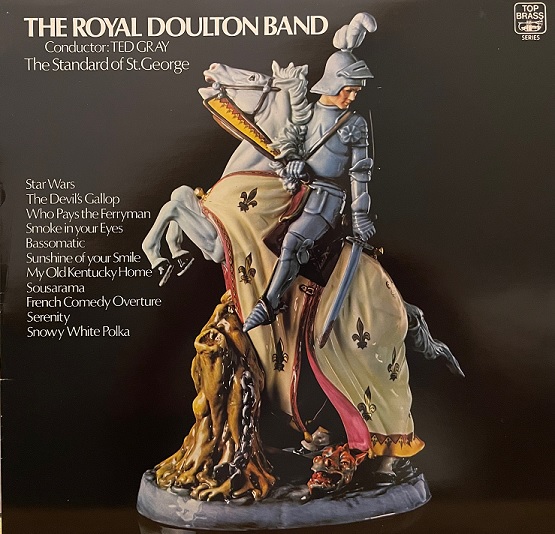
The band became a succesful concert and recording ensemble
Perhaps the part of his musical personality that saw him shy away from the spotlight of competitive narcissism that marked those who sought individual contesting acclaim, as Musical Director for the next 20 years he turned the band into a highly respected concert and recording band and effective ambassador for the company.
Competitive appearances were sparse, and he took his final contest bow with them in 1991.
Insignia of Honour
In 1974 he was presented with the ‘Insignia of Honour’ at the National Finals for “conspicuous service to brass bands.” It was an adjective that summed up with brass banding career perfectly.
In later years Teddy Gray suffered with ill health. He died on the 18th January 2009 aged 82.
A man at ease with himself and others, you suspect his was a banding career that fulfilled all that he wanted from it.
Tim Mutum
With thanks to Jimmie Charles
4BR Hall of Fame: No.1: Jack Atherton
https://www.4barsrest.com/articles/2019/1832.asp
4BR Hall of Fame: No.2: Albert Baile
https://www.4barsrest.com/articles/2019/1836.asp
4BR Hall of Fame: No.3: Stanley Boddington
https://www.4barsrest.com/articles/2019/1842.asp
4BR Hall of Fame: No.4: Bram Gay
https://www.4barsrest.com/articles/2020/1848.asp
4BR Hall of Fame: No.5: Leonard Lamb
https://www.4barsrest.com/articles/2020/1855.asp
4BR Hall of Fame: No.6: Arthur Stender
https://www.4barsrest.com/articles/2020/1866.asp
4BR Hall of Fame: No.7: Violet Brand
https://www.4barsrest.com/articles/2020/1871.asp
4BR Hall of Fame: No.8: Eric Bravington
https://www.4barsrest.com/articles/2020/1875.asp
4BR Hall of Fame: No.9: Norman Ashcroft
https://www.4barsrest.com/articles/2020/1879.asp
4BR Hall of Fame: No.10: Albert Chappell
https://www.4barsrest.com/articles/2020/1884.asp
4BR Hall of Fame: No.11: Betty Anderson
https://www.4barsrest.com/articles/2020/1889.asp
4BR Hall of Fame: No.12: Trevor Walmsley DFC
https://www.4barsrest.com/articles/2020/1897.asp
4BR Hall of Fame: No.13: Percy Code
https://www.4barsrest.com/articles/2020/1903.asp
4BR Hall of Fame: No.14: George Thompson MBE
https://www.4barsrest.com/articles/2020/1909.asp
4BR Hall of Fame: No.15: Willie Lang
https://www.4barsrest.com/articles/2020/1914.asp
4BR Hall of Fame: No.16: James Scott
https://www.4barsrest.com/articles/2021/1916.asp
4BR Hall of Fame: No.17: Jack Mackintosh
https://www.4barsrest.com/articles/2021/1922.asp













